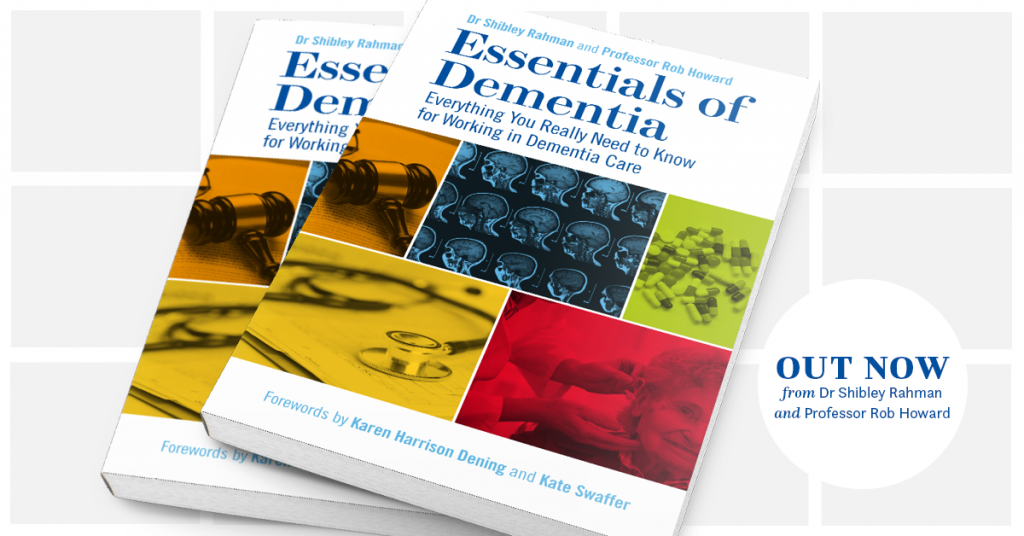In this blog post, author Dr Shibley Rahman addresses the urge to recognise the needs of the workforce in dementia education and training by asking a simple, yet poignant, question: what real progress has been made in this direction over the past few years?
The current Prime Minister’s Dementia Challenge 2020 has successfully improved the awareness of dementia (and quality in other areas), but it also did produce a lot of other industrious contributions, such as courses and conferences, not always with a primary aim of educating the workforce.
A lot has been made of the finding that people living with dementia are “core users” of the NHS and social care. And it has been said “dementia is everybody’s business”. But these tropes are too easy to trot out. Rather, the needs of people with dementia and their care partners often go unaddressed, despite much effort being publicly pumped into ‘dementia awareness’.
Just before Christmas last year, as a full time carer of a family relative with dementia, I had reason to experience at close quarters an English hospital admission. Although I am loath to extrapolate from what was essentially an anecdotal experience, I found the mismatch between reality and political rhetoric quite revealing.
The first (and only) full English dementia strategy document entitled, “Living well with dementia” (Department of Health, 2009) clearly made educating the workforce a policy aim:
“Objective 13: An informed and effective workforce for people with dementia.
All health and social care staff involved in the care of people who may have dementia to have the necessary skills to provide the best quality of care in the roles and settings where they work. To be achieved by effective basic training and continuous professional and vocational development in dementia.” p.65
There have subsequently been multiple mutterings, including from the powerful great-and-the-good at conferences, about the ‘need to educate the workforce’. This aspiration is often delivered in a rather technocratic, motherhood and apple pie way, but, apart from research grants devoted to ‘education of the workforce’, one has to wonder what real sustainable progress has been made in training about dementia? There are some glimmers of hope, however. For example, a study of an ethnodrama called “Barbara’s Story” recently precipitated an inquiry into how effective care is, and how it could be changed.
The “Dementia Core Skills Learning Framework” (“Framework”) was originally commissioned and funded by the Department of Health and developed in collaboration by Skills for Health and Health Education England in partnership with Skills for Care. The framework, launched in 2015, contains 14 themes:
- Dementia awareness
- Dementia identification, assessment and diagnosis
- Dementia risk reduction and prevention
- Person-centred dementia care
- Communication, interaction and behaviour in dementia care
- Health and well-being in dementia care
- Pharmacological interventions in dementia care
- Living well with dementia and promoting independence
- Families and carers as partners in dementia care
- Equality diversity and inclusion in dementia care
- Law, ethics and safeguarding in dementia care
- End of life dementia care
- Research and evidence-based practice in dementia care
- Leadership in transforming dementia care
The Framework, the result of substantial work, is quite interesting in itself, and easily accessible here.
There is still a danger that the well-meaning colleagues who work in other areas know little about dementia, but there’s a lot of dementia about. It is reckoned that there are 850,000 people with dementia in the UK, with numbers set to rise to over 1 million by 2025. We are all, perhaps, at danger of preaching to the converted. For this reason, I have written a short book, Essentials of Dementia, with Prof Rob Howard giving people a chance to learn more about dementia. It covers the ‘essentials’, defined by the key issues of the Framework referred to above. We also have the same 14 themes as chapter headings.
We wanted our book to be brief, up-to-date, easy readable, and relevant to current professionals and practitioners. I hope you feel it makes a useful contribution of some sort.
Dr Shibley Rahman graduated in neuroscience and medicine from Cambridge University. There he also completed his PhD in frontotemporal dementia, commencing a lifelong interest in the timely diagnosis of dementia. He also trained to postgraduate level in medicine, law and business. Shibley speaks regularly about dementia diagnosis and post-diagnostic care, researches wellbeing and advocates rights-based approaches. He is the author of Living Better with Dementia and Enhancing Health and Wellbeing in Dementia, also published by JKP.
Essentials of Dementia, co-authored with Professor Rob Howard, is an introductory reference guide that will help all of those involved in dementia care to develop their skills and expertise to better respond to the needs of people with dementia.

Hi my husband had vascular dementia I did 2 online courses with the Uni of Tasmania however I still want to learn more so I am able to understand and take care of him
My mother has vascular Dementia. She doesn’t live with me.12 years ago I lived with her due to this illness then. I had to find her a good home. I did but I still am involved in her care. So I enrolled in a course on Dementia but there is always something new to learn